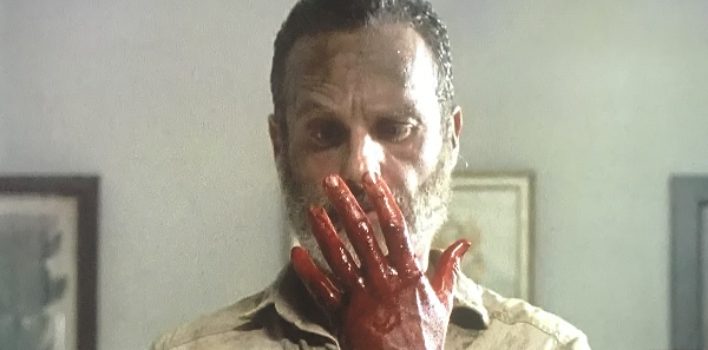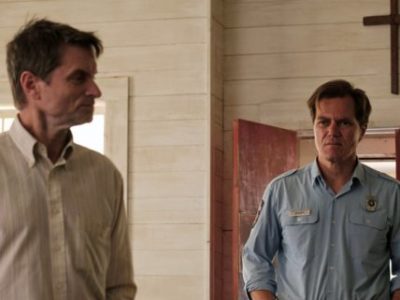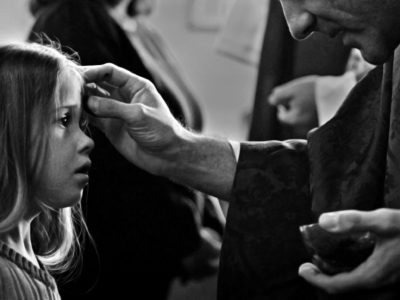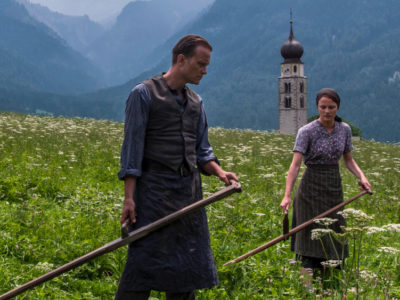The Walking Dead S9E5: What Comes After
The departure of Rick Grimes is probably only equaled in anticipation to the arrival of Negan. The circumstances outside the show are certainly different – I don’t believe showrunners wanted fans to know Andrew Lincoln was leaving – but the heightened attention is about the same. When it was announced last week that this was his last episode, it struck me that the potential death of Rick is probably on the level of Ross or Rachel departing Friends, or Jerry leaving Seinfeld, or Sam leaving Cheers. We are witness to the main character departing one of the most popular television series of all time. Depending on the direction it takes, we may forever reference this show Before Rick (BR) or After Rick (AR).
First let me lay another layer of praise onto the directing abilities of Greg Nicotero. Every episode thus far of season nine has been under his direction, likely due to the need to carefully handle the departure of Rick Grimes. That said, these last five episodes have been better than any string of five episodes since perhaps season three or four. Many would argue since the first season. A common calling card of Nicotero’s direction is that when a character dies, we’re shown flashbacks or hallucinations from that character’s life. Not quite a “life flashing before the eyes” type of thing, but an artfully crafted reminiscence of the moments and relationships that have shaped that person. We got the same artistic treatment last night with Rick. He predictably frees himself from the rebar-laced concrete he fell on last week, and as the show proceeded he went in and out of consciousness, hallucinating or dreaming of interactions with the living and the dead as he led the herd of walkers toward the bridge. I thought this approach was both beautiful and meaningful, and I think I’ve identified why it is Rick conjures up images of each respective person.
Shane
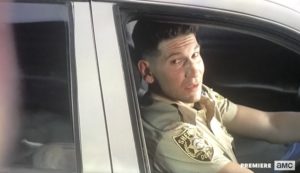 As Rick desperately clings to his senses on horseback, he finds temporary shelter in an abandoned home off a dirt road. Resting for a moment in that home, he slips into a dreamed interaction with Shane. We see Shane as we might all like to remember him; by Rick’s side in their patrol car. Yet he’s aware that he is dead, as is everyone Rick sees in his dreams this episode. Shane is even aware of how he died, and he uses that knowledge to speak to Rick. “You need to be like me”, he says, referring to his harshness and his rage. Shane represents Rick’s rage. The rage and harshness Rick learned from Shane. The rage he needed to survive the Governor, to escape Terminus, to protect Alexandria, and to fight Negan. In life, Rick saw this rage in Shane as a hindrance and a danger to the group. But he needed that rage to drive him forward in this moment for one final act bringing it all together to protect those he loves and to fight the dead.
As Rick desperately clings to his senses on horseback, he finds temporary shelter in an abandoned home off a dirt road. Resting for a moment in that home, he slips into a dreamed interaction with Shane. We see Shane as we might all like to remember him; by Rick’s side in their patrol car. Yet he’s aware that he is dead, as is everyone Rick sees in his dreams this episode. Shane is even aware of how he died, and he uses that knowledge to speak to Rick. “You need to be like me”, he says, referring to his harshness and his rage. Shane represents Rick’s rage. The rage and harshness Rick learned from Shane. The rage he needed to survive the Governor, to escape Terminus, to protect Alexandria, and to fight Negan. In life, Rick saw this rage in Shane as a hindrance and a danger to the group. But he needed that rage to drive him forward in this moment for one final act bringing it all together to protect those he loves and to fight the dead.
Hershel
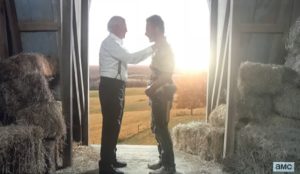 Rick barely escapes the house with his life, but once he does he’s on horseback again fighting to stay awake. He slips back out of consciousness, and dreams of Hershel in the barn. This may have been the most emotional of all Rick’s hallucinations. Hershel was like a father to Rick, but was also a leader alongside him. Through Hershel, Rick saw examples of redemption, mercy, and charity. Yet Hershel was a reminder of all the hardships that people like Maggie, Beth, and Glenn had gone through under Rick’s leadership. Hershel represents Rick’s humanity. Not in the sense that he is a stand in for all human kind, but in the sense that he reminds Rick that he doesn’t need to be harsh and ruthless all the time. Relationships with others instill in us a reason to strive on. They inspire our humanity and are a check against our animal instincts. Hershel reminded Rick of that in a time when he was only beginning to establish himself as the leader and meander the path of how to deal with other people in this world.
Rick barely escapes the house with his life, but once he does he’s on horseback again fighting to stay awake. He slips back out of consciousness, and dreams of Hershel in the barn. This may have been the most emotional of all Rick’s hallucinations. Hershel was like a father to Rick, but was also a leader alongside him. Through Hershel, Rick saw examples of redemption, mercy, and charity. Yet Hershel was a reminder of all the hardships that people like Maggie, Beth, and Glenn had gone through under Rick’s leadership. Hershel represents Rick’s humanity. Not in the sense that he is a stand in for all human kind, but in the sense that he reminds Rick that he doesn’t need to be harsh and ruthless all the time. Relationships with others instill in us a reason to strive on. They inspire our humanity and are a check against our animal instincts. Hershel reminded Rick of that in a time when he was only beginning to establish himself as the leader and meander the path of how to deal with other people in this world.
Sasha
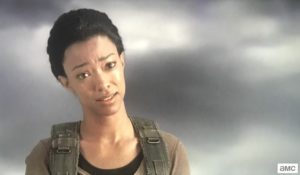 This interaction was a strange one to me at first, until I thought of it in light of what each of these people represent to Rick. We must remember how Sasha died. Recall the end of season seven; The First Day of the Rest of Your Life. Negan was prepared to use Sasha’s life as a bargaining chip to gain access into Alexandria, but she changed his plans. Where previously she was unwilling to sacrifice herself for her friends, she settled on that choice and took her own life. Sasha represents strength in sacrifice for Rick. I believe that until this point, Rick was still pondering what to do with this herd of walkers. He felt tied to the responsibility to protect everyone while still sticking around to lead them. With his injury, both of those things happening was becoming more and more unlikely. Sasha spoke of having strength for everyone else, which inspires strength in them. Rick’s strength doesn’t need to be shown by his survival. Sasha helps him see that there is strength to be found in sacrificing yourself for others. I think as Christians we can certainly echo those sentiments.
This interaction was a strange one to me at first, until I thought of it in light of what each of these people represent to Rick. We must remember how Sasha died. Recall the end of season seven; The First Day of the Rest of Your Life. Negan was prepared to use Sasha’s life as a bargaining chip to gain access into Alexandria, but she changed his plans. Where previously she was unwilling to sacrifice herself for her friends, she settled on that choice and took her own life. Sasha represents strength in sacrifice for Rick. I believe that until this point, Rick was still pondering what to do with this herd of walkers. He felt tied to the responsibility to protect everyone while still sticking around to lead them. With his injury, both of those things happening was becoming more and more unlikely. Sasha spoke of having strength for everyone else, which inspires strength in them. Rick’s strength doesn’t need to be shown by his survival. Sasha helps him see that there is strength to be found in sacrificing yourself for others. I think as Christians we can certainly echo those sentiments.
Michonne
Finally, as Rick makes it to the bridge, he sees all his friends come to his aid and kill the walkers. But he knows better. As Michonne is knelt beside him he realized this, too, is a dream. But it’s a dream that provides him assurance of the thing he’s been looking for this whole trip; his family. With Shane, Hershel, and Sasha he says he’s looking for his family, as if they’re lost. He thinks maybe he can find them in this after-life dream world, until he dreams of one who is still alive. Michonne represents Rick’s family. And not just his daughter and wife, but his entire community of which he serves as leader. His fear that he had lost them was really a fear of not being able to keep them safe. With this dream of them coming to his aid, and Michonne 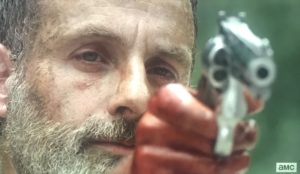 encouraging him that they don’t die – which is an oft-used phrase for this group that at this point is applied metaphorical – Rick can feel a peace of mind that they are in good hands. He finds the peace to do what he eventually must do to stop this herd in a final act of protection.
encouraging him that they don’t die – which is an oft-used phrase for this group that at this point is applied metaphorical – Rick can feel a peace of mind that they are in good hands. He finds the peace to do what he eventually must do to stop this herd in a final act of protection.
If you’ve watched then at this point you know how it goes. Despite efforts to divert the herd away from Rick, he blows up the bridge, sending the herd plunging into the river. For all the loss of life in this show, I think the closest I have come to tearing up was when I saw Daryl’s reaction to this. Just last episode he was fighting with Rick, but their bond is too strong for a disagreement to drive them apart. The shot of Daryl crying on the riverbanks, and walking dejectedly away from the scene, will forever stick in my memory.
Maggie’s revenge
Since I’m breaking this review into categories of interactions, I might as well do the same with this. Michonne’s dialogue with Negan last episode was masterful. Negan trying to leverage Michonne’s desire to kill the walkers was only bested by her exposing how empty and broken he truly is. When Maggie arrived at Alexandria, Michonne initially tries to stop her from confronting Negan. “Taking it back is gonna start something else”, Michonne warns. It had been 1-1/2 years and they have moved on. But that was the problem, Maggie hasn’t moved on and she fears she can’t unless she kills him. When Michonne finally let her through, we got an interaction even better than last week.
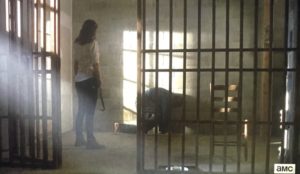 Last night, Negan was exposed even further as a shell of the man he was. What first began as taunting and posturing from him was shown to be little more than a plea to be killed. He recalled details about how he killed Glenn and how he enjoyed it. He taunted Maggie for it taking her so long to work up the courage to take him out. But it was all a veil. Maggie began to see through it, and demanded he come into the light. There, with his darkness laid bare, he breaks down and confesses his desire for death to be with his wife. This shock Maggie. This is not the man she planned vengeance upon. “I came to kill Negan, and you’re already worse than dead.”, she says. Maggie seems to have found peace without taking a life.
Last night, Negan was exposed even further as a shell of the man he was. What first began as taunting and posturing from him was shown to be little more than a plea to be killed. He recalled details about how he killed Glenn and how he enjoyed it. He taunted Maggie for it taking her so long to work up the courage to take him out. But it was all a veil. Maggie began to see through it, and demanded he come into the light. There, with his darkness laid bare, he breaks down and confesses his desire for death to be with his wife. This shock Maggie. This is not the man she planned vengeance upon. “I came to kill Negan, and you’re already worse than dead.”, she says. Maggie seems to have found peace without taking a life.
Jadis
Finally, in a twist that I doubt anyone saw coming, it turns out Rick did not die in the explosion. As Jadis is seconds away from her meeting with whoever is manning the helicopter, she sees Rick washed up on shore right by her. Immediately her plans change and she offers Rick up as a “B”, not an A, which we are left to assume means a strong survivor that can be put to work or can be made useful for this other mystery group. Rick is cared for in this helicopter as he is flown away to who-knows-where with Jadis. Clearly, Rick’s story is not over.
On Talking Dead, Scott Gimple revealed that AMC has plans for original films, feature length films, new series’ of varying length, and some of those will feature Rick. He teased that we will see characters both alive and currently dead. The stories may take place in the past, current day, or in the future. Basically, it appears that AMC is planning a Walking Dead Cinematic Universe built for the television screen. Looks like I gave up on Fear the Walking Dead a little too early.
My Rating: A+
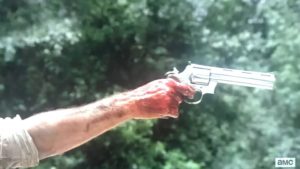 Listen, I understand that the blowback from the explosion would’ve sent Rick away from the river instead of into it. And I understand that it’s his left hand that is bloody all episode until they need a shot of him holding his gun with a bloody hand. I get all those nitpicky things, but the story elements in this episode were masterful. The (dare I say) cinematography of the scenes with Hershel and Sasha, the use of symbolism with each character, and the overall “heroes journey” captured within just Rick’s trip to the bridge was excellent. I’m not saying that I would’ve excused anything, but all that greatness can overcome a lot of continuity or editing problems for me. In the end, this is an automatic top-5 episode all time for this show.
Listen, I understand that the blowback from the explosion would’ve sent Rick away from the river instead of into it. And I understand that it’s his left hand that is bloody all episode until they need a shot of him holding his gun with a bloody hand. I get all those nitpicky things, but the story elements in this episode were masterful. The (dare I say) cinematography of the scenes with Hershel and Sasha, the use of symbolism with each character, and the overall “heroes journey” captured within just Rick’s trip to the bridge was excellent. I’m not saying that I would’ve excused anything, but all that greatness can overcome a lot of continuity or editing problems for me. In the end, this is an automatic top-5 episode all time for this show.


